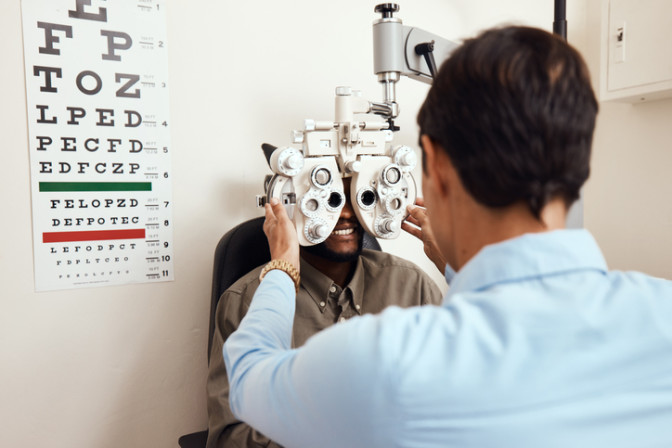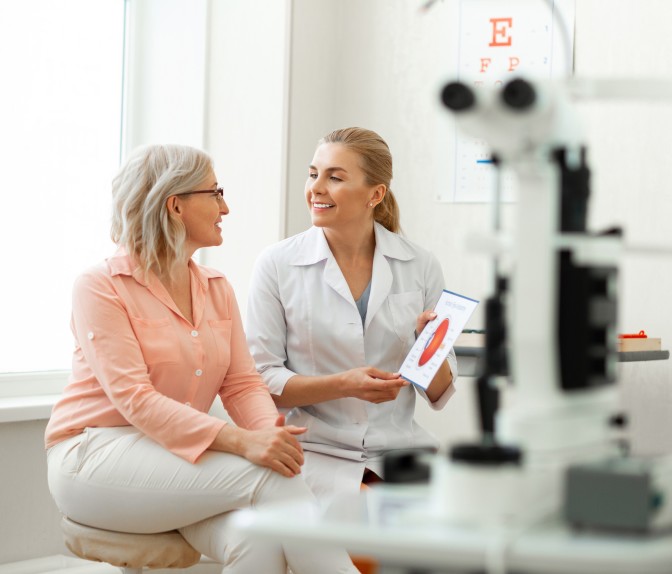50% OFF a Complete Pair of Glasses
*Restrictions apply. Click here for details.
Routine Eye Exams
Did you know that over 93 million adults in the United States are at a high risk of developing vision loss? It’s estimated that only half have visited their eye doctor in the last year for a routine eye exam. Keeping up with routine eye care allows your eye doctor to monitor for development of vision problems or eye diseases. Routine eye exams are especially important for those needing prescription lenses to see clearly, as the exam allows you to reevaluate the strength of your prescription on a yearly basis. Routine eye exams are important for more than just your eyes, as optometrists can identify other possible health conditions during an exam, such as diabetes and high blood pressure. Additionally, your vision insurance plan may cover the full or partial cost of the annual eye exam.

eyecarecenter provides comprehensive routine eye exams to individuals in our locations throughout the state of North Carolina. Learn more about the benefits of routine eye exams and schedule yours today.
The Importance of Routine Eye Exams
According to the CDC, vision loss ranks among the top ten causes of disability in the United States. Many eye conditions that cause vision loss, such as diabetic retinopathy, can be prevented with early detection and treatment. It's common to develop an eye condition without experiencing any symptoms, making it hard to identify on your own. A dilated eye exam allows your eye doctor to detect vision threatening eye conditions early on and determine preventative care.
Routine eye examinations are especially important for younger children, as they may be unaware that they need prescription lenses to see clearly. This can impact their performance in school, along with their quality of life. For those with glasses or contacts, a routine eye exam allows you to adjust your prescription as needed. It’s common to experience gradual changes in your vision as you age, requiring you to switch prescription lenses. A routine eye exam allows your doctor to monitor the health of your eyes, and helps you stay on top of your prescription.
What to Expect During Your Vision Check Up
If your eye exams haven’t been as “routine” as recommended, scheduling an eye exam can be scary. If you already have a pair of glasses or contact lenses, be sure to bring them along to your eye doctor appointment. The eye doctor will perform a variety of tests to identify any potential vision problems. These can include a visual acuity test, refraction test, or a slit lamp exam.
Visual Acuity Test
A visual acuity test allows the eye doctor to detect any weaknesses in your vision. This test is performed using a specially designed chart, known as a Snellen chart, which is comprised of different sized letters and numbers. Before beginning the visual acuity test, your eye doctor will ask for you to cover one of your eyes. This allows them to evaluate each eye separately and note any differences in vision strength.
After covering one of your eyes, the eye doctor will then ask you to read letters from the Snellen chart. These letters range in size, enabling your doctor to easily identify the distances you’re having difficulties seeing. Once one eye has been tested, the optometrist will then ask you to cover your other eye. Your doctor will then show you other Snellen charts, asking you to read what you can.

Refraction Test
If any vision problems are detected during the visual acuity test, the eye doctor may proceed with a refraction test.
A refraction test helps the eye doctor diagnose any refractive errors and determine if prescription lenses are necessary. To do this test, the optometrist will use a phoropter. A phoropter contains a variety of lenses with different levels of refraction, or prescription lenses. The eye doctor can easily change the lenses with the turn of a knob.
While using the phoropter, your eye doctor will ask you to try and read an eye chart to see if the lens is improving or worsening your vision.
At the end of your refraction test, you’ll be able to know if you’d benefit from prescription lenses and if so, what prescription is needed.
Slit Lamp Exam
Another type of exam that can occur during your routine eye check-up is a slit lamp exam. Before beginning the exam, your eye doctor may put eye drops in your eyes so that they can easily see any abnormalities in the eye during the exam. The eye doctor will ask you to stay seated in the exam chair and will bring the exam equipment to you. The eye doctor will then place an instrument in front of you, asking you to rest your chin and forehead in a particular position.
They will then turn the slit lamp on, which is just a high-powered light. The eye doctor will move the slit lamp around your face, allowing them to see different portions of the eye. The slit lamp exam allows the eye doctor to examine all areas of your eye and can help diagnose any eye problems such as macular degeneration, detached retina, cataracts, corneal abrasions, and even retinal blockages.
Does A Routine Eye Exam Include Dilation?

While at your eye exam, your doctor may recommend dilating your pupils. The pupil is the round opening in the center of the iris that allows light into the eye.
After eye drops are applied, the pupil will begin to dilate, or grow in size. This allows the optometrist a better view of the inside of the eye, making it easier to identify any potentially harmful eye conditions.
If you’ve gotten your pupils dilated during your routine eye exam, make sure to wear sunglasses when going outside and take caution when driving. Dilated pupils are sensitive to light and can cause blurry vision. The side effects from getting your pupils dilated will wear off over the next few hours.
How Often Should You Get a Routine Eye Exam?
The frequency of your routine eye exams can depend on your eye doctor’s recommendations. Typically, routine eye exams are performed every one to two years. This can increase if you have a family history of eye problems or health conditions such as diabetes.
Schedule A Routine Eye Exam Today

Life can be very busy, so it’s easy to forget to schedule a routine eye exam. A routine eye exam is crucial in helping individuals understand their vision and how it affects overall health.
The optometry team at eyecarecenter can help you take control of your vision again.
Our routine eye exams provide preventative care and can help treat potentially harmful eye conditions.
Schedule your appointment today or find a location near you!
